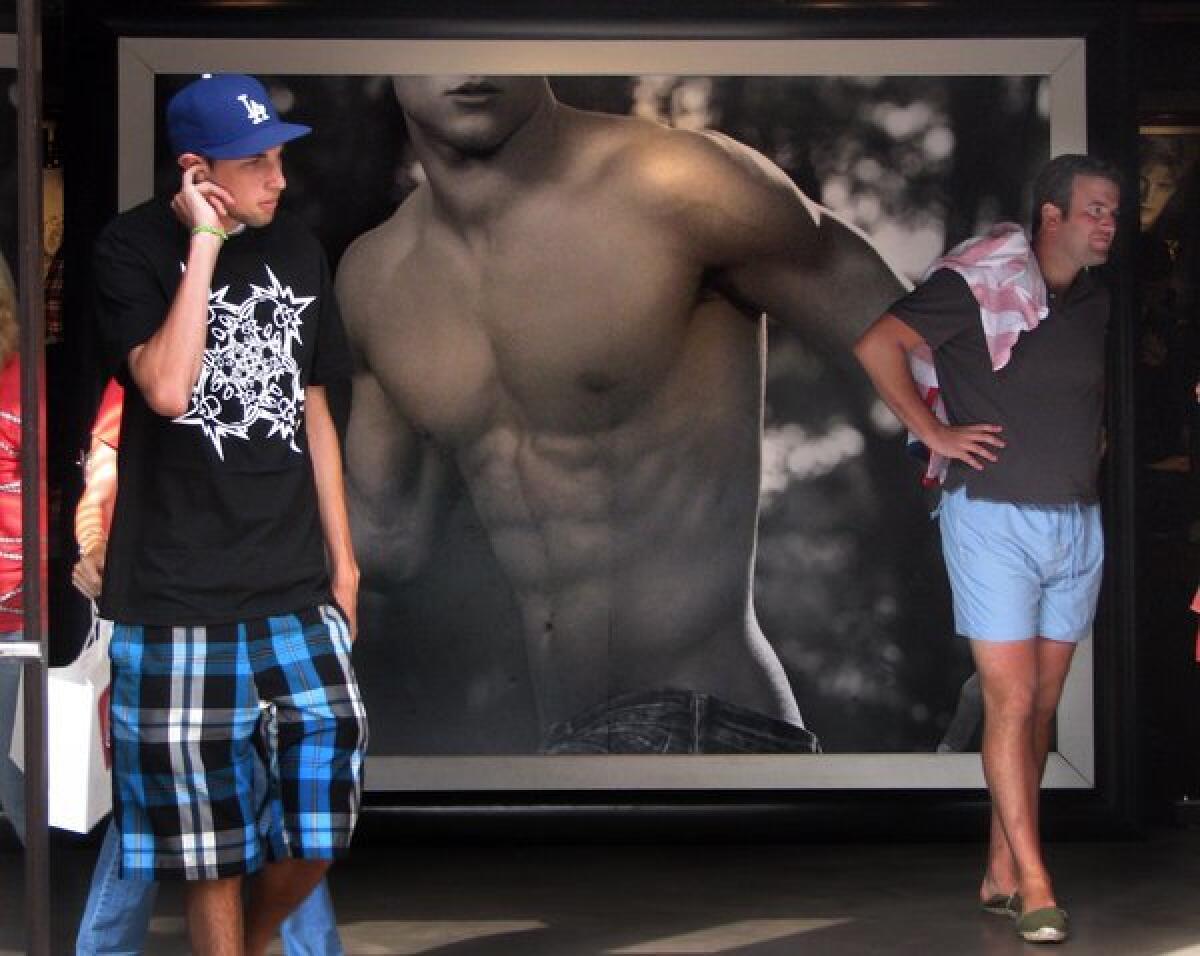A plus-size protest to Abercrombie and Fitch’s backward thinking

- Share via
The scandal over Abercrombie and Fitch’s exclusionary marketing strategy, now into its third week, shows no sign of letting up.
“You’ve probably heard about it if you are a teenager, have a teenager or if you like to wear your shorts where most of your butt hangs out,” Ellen DeGeneres said Monday on her show.
She noted that Abercrombie’s chief executive has said he won’t sell women’s clothes larger than size 10, then pulled a Barbie-sized polo shirt out of her pocket and declared it was the perfect size for his customers.
As the audience booed, she said, “Well, hear him out, he has a really good reason. According to him, anyone who is a plus size isn’t cool enough to shop at Abercrombie and Fitch. You know what I say? Oh Fitch, please.”
Anyone who has been waiting for a heartfelt apology from Abercrombie’s chief executive, Mike Jeffries, will be not be satisfied any time soon.
Last week, after the company said it had no comment on the kerfuffle, Abercrombie posted a message from Jeffries on its Facebook page. He specifically addressed the obnoxious comments he made to Salon in the 2006 profile that kicked up such a fuss again when they were repeated in a recent Business Insider story.
The statement is not an apology. It’s not even particularly honest.
“While I believe this 7-year-old, resurrected quote has been taken out of context,” Jeffries wrote, “I sincerely regret that my choice of words was interpreted in a manner that has caused offense. A&F is an aspirational brand that, like most specialty apparel brands, targets its marketing at a particular segment of customers.
“However, we care about the broader communities in which we operate and are strongly committed to diversity and inclusion. We hire good people who share these values. We are completely opposed to any discrimination, bullying, derogatory characterizations or other anti-social behavior based on race, gender, body type or other individual characteristics.”
The Salon quote was not taken out of context. You can read the piece for yourself here.
In any case, the company has a long history of causing offense – from its sexualized clothes for little girls to its catalog featuring an orgy to its racially insensitive T-shirts.
In 2004, Abercrombie was sued for discriminating against blacks, Latinos, Asians and women by giving preference to white males for floor sales and management positions. Abercrombie settled for $40 million and promised to revise its hiring policies.
Last week, after I wrote about Abercrombie’s latest self-inflicted black eye, I got an email from a reader that makes you wonder whether the company’s vows to end employment discrimination are just window dressing.
“Three days ago,” she wrote, “I was picking up a pair of jeans at a New York [Abercrombie and Fitch] store. I was wearing leggings, Keds, a military style light jacket and a tank top, and a manager approached me asking ‘Are you from the area? Do you want to work here?’ I was floored, and kindly said no but asked how they hire people and got this response: ‘We have to take resumes’ -- (rolls eyes) -- but we just look for really good looking young people in the store who look like our brand.’ ”
The controversy has inspired many small acts of defiance around the country. A mom in suburban Washington, D.C., boxed up her kids’ Abercrombie clothes and returned them to headquarters.
A group of students from a boarding school for obese kids made a video condemning Abercrombie.
A USC student urged people to donate their used Abercrombie clothes to their local homeless shelter.
And on Sunday, Jes A. Baker, who blogs as The Militant Baker, created her own mock Abercrombie campaign.
In an open letter to Jeffries on her blog, she writes, “The only thing you’ve done through your comments is reinforce the unoriginal concept that fat women are social failures, valueless and undesirable.”
She included a series of photos in which she is dressed in jeans and an Abercrombie T-shirt, or in jeans and no shirt, posing with a handsome, buff guy in jeans.
The difference between her photos and the usual Abercrombie fare is that, unlike the sylphs who populate Planet Abercrombie, Baker is a size 22.
“Not only do I know that I’m sexy, but I also have the confidence to pose nude in ways you don’t dare,” she writes. “You are more than welcome to prove me wrong by posing shirtless with a hot fat chick.”
Without even meaning to, as Baker points out, Jeffries has inspired a cultural discussion about the valorization and tyranny of the skinny ideal.
I don’t know that all the outrage will have much of an effect on Abercrombie and Fitch, which makes fairly boring, overpriced clothes for teens craving the imprimatur of what someone else has deemed “cool.”
But I do like what DeGeneres had to say about that on Monday: “What you look like on the outside is not what makes you cool at all. I mean, I had a mullet and I wore parachute pants for a long, long time. And I’m doin’ OK.”
Twitter: @robinabcarian
Email: [email protected]
More to Read
Sign up for Essential California
The most important California stories and recommendations in your inbox every morning.
You may occasionally receive promotional content from the Los Angeles Times.











